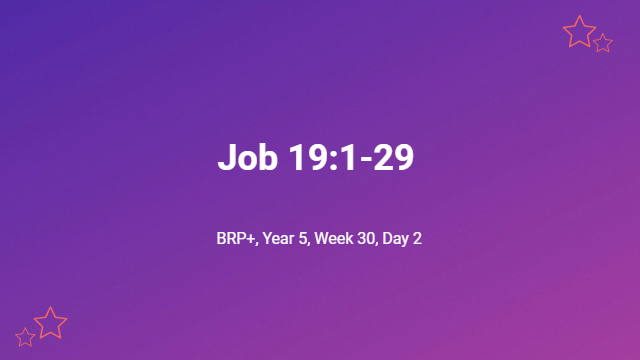Job 19:1-29
Q.1. How was Job impacted by the words of his friends? What was his defence and plea? Did he have the right to question God’s treatment of him? – (Job 19:1-22)
Since Job’s friends believed that suffering was punishment for sin, Job was tormented. They had not been able to define his sin but condemned him anyway. Job responded, that even if his suffering was caused by sin, they had no right to denounce him. As it was, he felt that God had wronged him by giving him no explanation, and that He was treating him as the enemy, rather than His servant. All his brothers and acquaintances had abandoned him. His servants took no notice of him. He was skin and bones, and his breath made him repulsive to his associates. Whether he had a right to complain or not, we can certainly empathize with his distress over the devastating changes in his life and circumstances.
Q.2. What do the Messianic references say about the writings of Job? How would Job’s words have comforted Jesus in His sufferings? – (Job 19:7-22)
Yet somehow, out of the depths of the despair that Job was suffering, he uttered some amazing Messianic prophecies that pointed to the sufferings of Christ. Job was counted among the prophets Noah and Daniel. He foreshadowed that the Son of God was to be stripped of honour – 13 “He has removed my brothers far from me, and my acquaintances are completely estranged from me. 14 “My relatives have failed, and my intimate friends have forgotten me (Job 19:13-14 c.f. 19:9; Ezk.14:14 & 20). He described the pitiful condition of Christ on the Cross and identified – for the hand of God has struck Me (Job 19:21 c.f. 19:20). All these prophecies explain why, in the Garden of Gethsemane, Jesus recoiled from facing the horror of what He was to suffer as man’s sin-bearer. (Mt.26:36-39).
Q.3. How close was Job to death? What was Job’s hope and assurance? Why should we be slow to judge others? – (Job 19:20-29)
Job longed that his words would be forever inscribed in a book – … And I have escaped only by the skin of my teeth (Job 19:20 c.f. 19:23-24). Indeed, they were. His words suggested that he was close to death. This term has also passed into our language, expressing a close encounter with death. However, out of this gloom and darkness, come some of Scriptures’ greatest declarations of confidence and hope – 25 “As for me, I know that my Redeemer lives, and at the last He will take His stand on the earth. 26 “Even after my skin is destroyed, yet from my flesh I shall see God; 27 Whom I myself shall behold, and whom my eyes will see and not another … (Job 19:25-27). To hold fast to such an assurance makes suffering bearable and makes dying less daunting. Job added this warning to his critics – be afraid of the sword for yourselves, for wrath brings the punishment of the sword, so that you may know there is judgment (Job 19:29).

